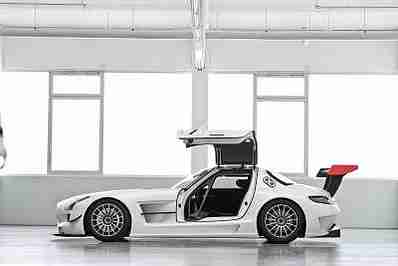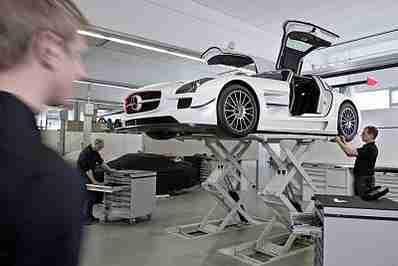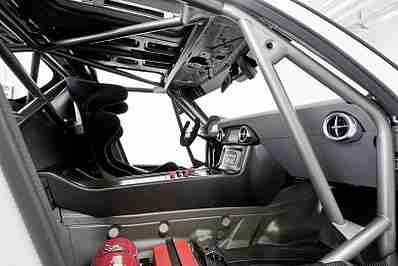 This racing version of the gullwing model stands out with its
spectacular design and thoroughbred motor sports technology. Developed to
comply with the GT3 specifications of the FIA (Fédération
Internationale de l'Automobile), the SLS AMG GT3 is designed as a racing
sports car for customers competing in sprints and long-distance races. These
race series for near-series GT cars are noted for their very varied participants
and great excitement. Not least because of their comparatively fa-vourable
cost structure, they are enjoying increasing worldwide popularity. AMG, the
performance brand within Mercedes-Benz, is entering a new business sector
with the new SLS AMG GT3: the development, production and marketing of sports
racing cars intended for customer use. Sales of these cus-tomer cars are
expected to commence in autumn 2010, and homologation of the GT3 variant
will be completed in time for the 2011 racing season. "Thanks to uncompromising
lightweight construction and superior handling dynamics, the SLS AMG provides
an outstanding basis for a highly competitive racing car. This exciting GT3
version is our response to strong customer demand for a car designed for
these attractive motor sports series. Once again, it demonstrates AMG's huge
experience gained in more than 40 years of motor sports, and its great expertise
in the development of unique high-performance cars," says Volker Morn-hinweg,
Chairman of Mercedes-AMG GmbH. The new SLS AMG GT3 is an emphatic continuation
of AMG's commitment to mo-tor sports. AMG has been a pioneer in the motor
sports world ever since its founda-tion in 1967. The new racing version of
the Mercedes-Benz SLS AMG is developed and produced by AMG in close cooperation
with HWA AG. HWA is responsible for the DTM racing team on behalf of
Mercedes-Benz Motorsports. The HWA team is one of the most successful in
international motor sports, as witness nine driver cham-pionships in the
DTM and ITC, as well as two championship titles in the FIA GT Championships.
The SLS AMG GT3 is set to write another chapter in this success story, and
harks back to the 300 SL racing sports car of 1952 which first established
the "gullwing" legend. Its historic victory in the "Carrera Panamericana"
long-distance race also made Mercedes-Benz a household name in North and
Central America, and demonstrated the know-how and expertise of the
Stuttgart-based automobile company. This racing version of the gullwing model stands out with its
spectacular design and thoroughbred motor sports technology. Developed to
comply with the GT3 specifications of the FIA (Fédération
Internationale de l'Automobile), the SLS AMG GT3 is designed as a racing
sports car for customers competing in sprints and long-distance races. These
race series for near-series GT cars are noted for their very varied participants
and great excitement. Not least because of their comparatively fa-vourable
cost structure, they are enjoying increasing worldwide popularity. AMG, the
performance brand within Mercedes-Benz, is entering a new business sector
with the new SLS AMG GT3: the development, production and marketing of sports
racing cars intended for customer use. Sales of these cus-tomer cars are
expected to commence in autumn 2010, and homologation of the GT3 variant
will be completed in time for the 2011 racing season. "Thanks to uncompromising
lightweight construction and superior handling dynamics, the SLS AMG provides
an outstanding basis for a highly competitive racing car. This exciting GT3
version is our response to strong customer demand for a car designed for
these attractive motor sports series. Once again, it demonstrates AMG's huge
experience gained in more than 40 years of motor sports, and its great expertise
in the development of unique high-performance cars," says Volker Morn-hinweg,
Chairman of Mercedes-AMG GmbH. The new SLS AMG GT3 is an emphatic continuation
of AMG's commitment to mo-tor sports. AMG has been a pioneer in the motor
sports world ever since its founda-tion in 1967. The new racing version of
the Mercedes-Benz SLS AMG is developed and produced by AMG in close cooperation
with HWA AG. HWA is responsible for the DTM racing team on behalf of
Mercedes-Benz Motorsports. The HWA team is one of the most successful in
international motor sports, as witness nine driver cham-pionships in the
DTM and ITC, as well as two championship titles in the FIA GT Championships.
The SLS AMG GT3 is set to write another chapter in this success story, and
harks back to the 300 SL racing sports car of 1952 which first established
the "gullwing" legend. Its historic victory in the "Carrera Panamericana"
long-distance race also made Mercedes-Benz a household name in North and
Central America, and demonstrated the know-how and expertise of the
Stuttgart-based automobile company.
Spectacular racing car looks and top-class
performance
 The purist design and breathtaking contours of this gullwing
model are effectively emphasised by specific modifications to the bodywork.
The new components made mainly from carbon-fibre are an unmistakable testimony
to the outstanding race-track performance and extensive aerodynamic development
work. At the front the GT3 racing car has a new front apron with larger air
intakes: the wide aperture below the characteristic radiator grille with
a large Mercedes star and a wing-shaped transverse fin supplies the engine
oil cooler and brake discs with cooling air. The two air intakes below the
vertically arranged bi-xenon headlamps have the same function. Downforce
at the front axle is provided by four externally mounted "flics" and the
carbon-fibre front splitter: this blends into the smooth underbody cladding
which ends with the rear diffuser. The bonnet has a central aperture to dissipate
the engine heat. The hot air is vented in the wheel arches from side vents
in the front wings. Particularly light-weight polycarbonate is used to glaze
the side and rear windows, and this is also available for the windscreen.
The front and rear wings have been widened to make space for the large racing
tyres. With a width of 1990 millimetres, the body of the GT3 is a good 50
millimetres wider than that of the standard SLS AMG. The new side skirts
have apertures for cooling the rear brakes. The smooth underbody is visible
at the lower edges of the side skirts. The standardised filler pipe for the
fast-refuel system is accommodated in the B-pillar. The 120-litre fuel tank
is centrally located behind the driver. The purist design and breathtaking contours of this gullwing
model are effectively emphasised by specific modifications to the bodywork.
The new components made mainly from carbon-fibre are an unmistakable testimony
to the outstanding race-track performance and extensive aerodynamic development
work. At the front the GT3 racing car has a new front apron with larger air
intakes: the wide aperture below the characteristic radiator grille with
a large Mercedes star and a wing-shaped transverse fin supplies the engine
oil cooler and brake discs with cooling air. The two air intakes below the
vertically arranged bi-xenon headlamps have the same function. Downforce
at the front axle is provided by four externally mounted "flics" and the
carbon-fibre front splitter: this blends into the smooth underbody cladding
which ends with the rear diffuser. The bonnet has a central aperture to dissipate
the engine heat. The hot air is vented in the wheel arches from side vents
in the front wings. Particularly light-weight polycarbonate is used to glaze
the side and rear windows, and this is also available for the windscreen.
The front and rear wings have been widened to make space for the large racing
tyres. With a width of 1990 millimetres, the body of the GT3 is a good 50
millimetres wider than that of the standard SLS AMG. The new side skirts
have apertures for cooling the rear brakes. The smooth underbody is visible
at the lower edges of the side skirts. The standardised filler pipe for the
fast-refuel system is accommodated in the B-pillar. The 120-litre fuel tank
is centrally located behind the driver.
Wide rear apron of carbon-fibre
 Viewed from the rear, the SLS AMG GT3 impresses with its sheer
width. The boot lid is surmounted by a wide carbon-fibre rear aerofoil, which
has multiple adjustments and allows a perfect setup for the type of racetrack
concerned. The new rear apron features two apertures designed to vent the
rear wheel arches. The carbon-fibre rear diffuser is another eyecatching
feature: as an extension to the smooth underbody, it gradually rises in the
rear axle area and generates a downforce thanks to its shape. The overall
aerodynamic concept of the SLS AMG GT3 was refined and finalised in extensive
wind tunnel and racetrack tests. The black exhaust tailpipes emit a thrilling
and very characteristic AMG eight-cylinder sound. The rain light prescribed
by the rulebook is integrated into the boot lid - it must remain permanently
switched on if the weather conditions are poor. Viewed from the rear, the SLS AMG GT3 impresses with its sheer
width. The boot lid is surmounted by a wide carbon-fibre rear aerofoil, which
has multiple adjustments and allows a perfect setup for the type of racetrack
concerned. The new rear apron features two apertures designed to vent the
rear wheel arches. The carbon-fibre rear diffuser is another eyecatching
feature: as an extension to the smooth underbody, it gradually rises in the
rear axle area and generates a downforce thanks to its shape. The overall
aerodynamic concept of the SLS AMG GT3 was refined and finalised in extensive
wind tunnel and racetrack tests. The black exhaust tailpipes emit a thrilling
and very characteristic AMG eight-cylinder sound. The rain light prescribed
by the rulebook is integrated into the boot lid - it must remain permanently
switched on if the weather conditions are poor.
Near-series AMG 6.3-litre V8 engine
 As prescribed by the FIA GT3 rules, the AMG 6.3-litre V8 engine
is practically identical to that in the standard model. Thanks to its lower
weight, the GT3 will easily better the already outstanding acceleration of
the standard model - 3.8 seconds from zero to 100 km/h; depending on the
final drive ratio, the top speed will exceed 300 km/h. The AMG 6.3-litre
V8 engine also has a dry sump lubrication system in the racing model. Using
vacuum and pressure pumps, as well as an external oil tank, makes it possible
to dispense with a conventional sump. This technology ensures reliable en-gine
lubrication even under the high lateral acceleration forces encountered on
the racetrack. Dry sump lubrication also allows a low installed position
for the V8 engine - one of the key technological highlights of the SLS AMG.
Installing the eight-cylinder engine in the lowest possible position behind
the front axle as a front-mid engine, and combining it with the transmission
in a transaxle arrangement, produces a very fa-vourable weight distribution. As prescribed by the FIA GT3 rules, the AMG 6.3-litre V8 engine
is practically identical to that in the standard model. Thanks to its lower
weight, the GT3 will easily better the already outstanding acceleration of
the standard model - 3.8 seconds from zero to 100 km/h; depending on the
final drive ratio, the top speed will exceed 300 km/h. The AMG 6.3-litre
V8 engine also has a dry sump lubrication system in the racing model. Using
vacuum and pressure pumps, as well as an external oil tank, makes it possible
to dispense with a conventional sump. This technology ensures reliable en-gine
lubrication even under the high lateral acceleration forces encountered on
the racetrack. Dry sump lubrication also allows a low installed position
for the V8 engine - one of the key technological highlights of the SLS AMG.
Installing the eight-cylinder engine in the lowest possible position behind
the front axle as a front-mid engine, and combining it with the transmission
in a transaxle arrangement, produces a very fa-vourable weight distribution.
Six-speed racing transmission with sequential
gear-changes
Unlike in the standard model, power in the SLS AMG GT3 is transferred by
a six-speed racing transmission with sequential gear-changes. Thanks to its
compact con-struction, this race-tested transmission has advantages in terms
of packaging - after all, the GT3 version has a smaller ground clearance
than the standard model. The driver shifts the gears using two shift paddles
on the steering wheel. The transmission is mounted directly on the rear axle,
and connected to the V8 engine via a flexurally and torsionally rigid torque
tube. This has decisive advantages with respect to han-dling dynamics, as
this sophisticated solution enables the entire powertrain to be configured
with far less free play. In conjunction with the traction control system,
a multi-disc locking differential integrated into the transmission en-sures
outstanding acceleration. A drive shaft rotates at the engine speed within
this torque tube. As in the standard model, and also the Mercedes-Benz C-Class
DTM racing cars, the shaft is made from carbon-fibre. The vehicle concept
of the SLS AMG is predestined for top-class racetrack perform-ance, with
a long wheelbase, a low centre of gravity and a wide track. Its strengths
in-clude precise over/understeer characteristics, first-class agility, low
inertia during fast changes of direction and high physical limits when cornering.
Very few modifications were required for perfect racetrack performance: the
low-ered, lightweight aluminium suspension with double wishbones all-round
has the ideal kinematics. Multiple adjustments allow the best possible adaptation
to the relevant racetrack characteristics and prevailing weather conditions.
Not only the spring and damper setups, but also the track width and camber,
the suspension height and the stabilisers at the front and rear axles can
be adjusted. The rack-and-pinion steering system with speed-sensitive servo
assistance is basically the same as in the standard SLS AMG. The more direct
steering ratio makes for even more agile handling on the racetrack.
AMG motor sports braking system with composite
technology
 The AMG motor sports braking system ensures extremely short
braking distances, outstanding fade-resistance and great sensitivity: race-tested
composite technology is used for all the brake discs. In this system, the
grey cast-iron discs are mounted on an aluminium bowl via stainless steel
connections in a radially and axially floating arrangement. This sophisticated
technology allows perfect heat conduction, and therefore reliable
fade-resistance. The SLS AMG GT3 also features precisely configured cooling
ducts: apertures in the front apron and in front of the rear wheels supply
the brake discs with cool air when on the move. All four brake discs are
ventilated, grooved and perforated. Six-piston fixed calipers at the front
and four-piston fixed calipers at the rear in anthracite with a white AMG
logo allow generous brake lining surfaces. An anti-lock braking system with
a special racing configura-tion is standard. For space reasons, the AMG
high-performance ceramic composite braking system optionally available for
the standard model is not compatible with the 18-inch wheels prescribed by
the FIA rulebook. The size 12 x 18-inch (front) and 13 x 18-inch (rear) AMG
light-alloy wheels with central locking are shod with racing tyres in size
287 x 682 mm (front) and 315 x 708 mm (rear). Depending on the conditions,
untreaded slicks, intermediates or rain tyres are used. The classic multi-spoke
design assists ventilation of the braking system. Rapid pitstops and
wheel-changes are assured by the pneumatic jacking system integrated into
the underbody: four pneumatic jacks lift the GT3 racing car by around 190
millimetres to allow very rapid wheel-changes by the pit crew. The AMG motor sports braking system ensures extremely short
braking distances, outstanding fade-resistance and great sensitivity: race-tested
composite technology is used for all the brake discs. In this system, the
grey cast-iron discs are mounted on an aluminium bowl via stainless steel
connections in a radially and axially floating arrangement. This sophisticated
technology allows perfect heat conduction, and therefore reliable
fade-resistance. The SLS AMG GT3 also features precisely configured cooling
ducts: apertures in the front apron and in front of the rear wheels supply
the brake discs with cool air when on the move. All four brake discs are
ventilated, grooved and perforated. Six-piston fixed calipers at the front
and four-piston fixed calipers at the rear in anthracite with a white AMG
logo allow generous brake lining surfaces. An anti-lock braking system with
a special racing configura-tion is standard. For space reasons, the AMG
high-performance ceramic composite braking system optionally available for
the standard model is not compatible with the 18-inch wheels prescribed by
the FIA rulebook. The size 12 x 18-inch (front) and 13 x 18-inch (rear) AMG
light-alloy wheels with central locking are shod with racing tyres in size
287 x 682 mm (front) and 315 x 708 mm (rear). Depending on the conditions,
untreaded slicks, intermediates or rain tyres are used. The classic multi-spoke
design assists ventilation of the braking system. Rapid pitstops and
wheel-changes are assured by the pneumatic jacking system integrated into
the underbody: four pneumatic jacks lift the GT3 racing car by around 190
millimetres to allow very rapid wheel-changes by the pit crew.
Interior with racing bucket seat and racing
steering wheel
 Opening the gullwing doors of the SLS AMG GT3 reveals a functional
interior with a racing car atmosphere. The driver is seated in a racing bucket
seat, his safety assured by a six-point seat belt and the HANS system (Head
and Neck Support), which fixes his helmet in a defined position during an
accident to minimise the risk of injury. Additional safety is provided by
the steel rollover cage, which also serves to reinforce the aluminium spaceframe.
A racing steering wheel with a diameter of 330 millimetres allows perfect
vehicle control. Thanks to the open upper section of the rim, the driver
always has a clear view of the central display. This keeps him informed about
all the relevant parameters such as speed, engine rpm, operating temperatures,
lap times and the selected gear. The steering wheel also has a quick-locking
feature which allows much easier access and egress. Switches on the steering
wheel boss enable the driver to activate addi-tional functions such as the
radio link to the pits, headlamp flasher or the drink func-tion. Further
controls are mounted on the centre console, for example the start/stop function
for the AMG V8 engine, the traction control system, reverse gear and - if
the worst should happen - the integrated fire extinguisher system. The brake
balance adjustment control is mounted on the tunnel of the torque tube. The
near-series specification of the GT3 version is reflected in the dashboard,
whose powerfully arching wing section gives an impression of width. Strikingly
integrated into the dashboard, the air vents galvanised in "Silver Shadow"
have ad-justable, cruciform nozzles reminiscent of an aircraft's jet engines. Opening the gullwing doors of the SLS AMG GT3 reveals a functional
interior with a racing car atmosphere. The driver is seated in a racing bucket
seat, his safety assured by a six-point seat belt and the HANS system (Head
and Neck Support), which fixes his helmet in a defined position during an
accident to minimise the risk of injury. Additional safety is provided by
the steel rollover cage, which also serves to reinforce the aluminium spaceframe.
A racing steering wheel with a diameter of 330 millimetres allows perfect
vehicle control. Thanks to the open upper section of the rim, the driver
always has a clear view of the central display. This keeps him informed about
all the relevant parameters such as speed, engine rpm, operating temperatures,
lap times and the selected gear. The steering wheel also has a quick-locking
feature which allows much easier access and egress. Switches on the steering
wheel boss enable the driver to activate addi-tional functions such as the
radio link to the pits, headlamp flasher or the drink func-tion. Further
controls are mounted on the centre console, for example the start/stop function
for the AMG V8 engine, the traction control system, reverse gear and - if
the worst should happen - the integrated fire extinguisher system. The brake
balance adjustment control is mounted on the tunnel of the torque tube. The
near-series specification of the GT3 version is reflected in the dashboard,
whose powerfully arching wing section gives an impression of width. Strikingly
integrated into the dashboard, the air vents galvanised in "Silver Shadow"
have ad-justable, cruciform nozzles reminiscent of an aircraft's jet engines.
Deliveries of customer vehicles will commence
in spring 2011
The new SLS AMG GT3 was developed to comply with the international FIA GT3
race rules, and is entitled to take part in all GT3 race series - which of
course includes the popular 24-hour race in Spa-Francorchamps (Belgium) or
the Nürburg-ring. Interested customers are able to order the GT3 from
autumn 2010, and delivery will take place in time for the start of the 2011
racing season. Homologation will be completed in March 2011. |
